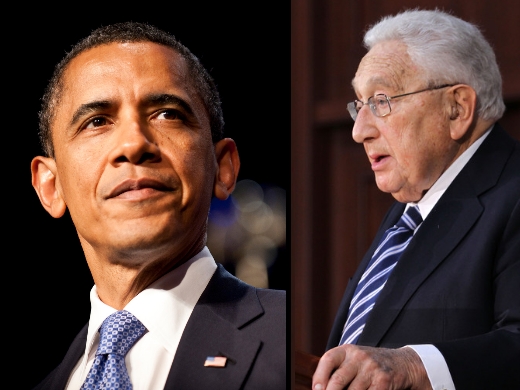The editorial of Ebtekar daily on September 9 focused on stark differences in recent comments by President Obama and strategist Henry Kissinger about Iran’s regional role and the threat it poses to American interests. It described the comparison the two drew between Iran and ISIL as a blunder. The following is the translation of the editorial in its entirety:
Over the past few days two very prominent American figures none other than President Barack Obama and former Secretary of State Henry Kissinger have made apparently contradictory comments about Iran’s role in the region and the world. The Democrat president told NBC News [Meet the Press] “The problem for Sunni states in the region, many of whom are our allies, is not simply Iran. It’s not simply a Sunni-Shia issue. Sunni extremism, as represented by ISIL, is the biggest danger that they face right now.”
His comments came after veteran US diplomat Henry Kissinger, who has served as the national security adviser [to President Nixon] and secretary of state [in the administrations of Presidents Nixon and Ford], expressed seemingly contradictory views about the role Iran plays in the region and about ties between Tehran and Washington. “I consider Iran a bigger problem than ISIS.”The clout Iran has in the Middle East gives it “the opportunity to reconstruct the ancient Persian Empire”.
At first glance, the gap in the comments by the old diplomat and the relatively young president, is so wide that they sound mutually exclusive in diplomatic terms. In other words, the comments of either one or both should be ignored.
No doubt, a country which has played an undeniable role in human civilization and a terrorist group are like apples and oranges. You can never draw an analogy between them. That is the first fundamental problem one can associate with the remarks of President Obama and Secretary Kissinger.
One can never compare the conduct of a sovereign state which has real social status and a legal political structure with that of a bunch of terrorist militants who flaunt all ethical norms and legal principles of the international community, a group whose structure defies all well-defined standards. Let’s assume the two Americans said what they said to clarify their stance – in Obama’s case – and view – in Kissinger’s case. That would help you take a better look at their remarks.
In addressing America’s Sunni Arab allies, Obama rightly described ISIL [also known as ISIL and IS] as the biggest threat to the region and the wider world. Until very recently this prominent world figure held a very different view. If the international community commissioned a panel to investigate the reasons behind the emergence of ISIL, it would definitely point a finger of blame at Washington, more specifically at the Oval Office.
Between early 2011 and earlier this year, the Americans, who support the so-called Friends of Syria Group, ignored warnings by Iran and some other countries [about ISIL] and thus turned the region into a backyard for the growth of the Islamic State of Iraq and the Levant.
After three years of failure to correctly analyze the realities of Iraq and Syria, American analysts and advisers to President Obama have finally come to the same conclusion that Tehran had drawn a long time ago. Iran had warned the Americans about the dangers of a Western-Turkish-Arabic alliance in a land whose features are unknown to them.
As predicted, the tide has turned for the Americans, so much so that Obama, who is a realist, describes the new policy of his government as “inevitable tactic”. An approach that seeks to place Iran, the US and Sunni Arab countries on the same front. So it is not surprising for a realist American president to seek a new chapter in relations with Iran to extract his country from the quagmire of ISIL, Iraq and Syria.
In parallel, American media covered the new analysis of Henry Kissinger, who is viewed as one of the best US strategists, on ISIL. Although both Obama and Kissinger are more trusted by American realists than by idealists, over the past six years, Kissinger’s analysis of America’s foreign policy and the way the US should handle international affairs has been totally different from that of the president. Kissinger is the same person who handed a signed copy of his book “Diplomacy” to Mohammad Javad Zarif, when he was Iran’s UN ambassador. It was signed “To Zarif, my respectful enemy”.
To better understand the attitude of Kissinger toward Iran, one should explore his views about the role of the US in the world after the Second World War and about America’s handling of the Middle East in recent decades.
As a person whose views took shape largely when the Soviets were in their prime during the Cold War and during the Vietnam War, Kissinger tends to condition the superior power of the US on the bipolarity of the world. That is why he believes the survival of Washington hinges on the existence of a big enemy or enemies that are as strong as an empire. Thus he realistically refers to the clout of Iran in the Middle East and North America and in a place as far away as South America.
With that in mind, Kissinger describes US policy toward Iran as a strategy rather than an inevitable tactic, says he considers “Iran a bigger problem than ISIS”, and calls Iran’s UN ambassador a “respectful enemy”.
